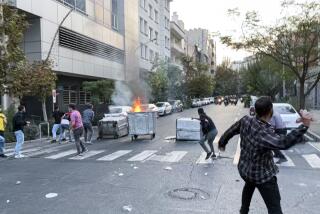‘Tit for Tat’ Time Is Past, So Make the Daniloff Trade
- Share via
Angered by Moscow’s refusal to dismiss espionage charges against American journalist Nicholas S. Daniloff and allow him to leave the Soviet Union, indignant politicians and officials continue to argue that the United States should be playing “tit for tat” with the Soviets. If Daniloff is not unconditionally released, they say, President Reagan should not have a summit with Soviet leader Mikhail S. Gorbachev, and U.S.-Soviet arms-control negotiations should also be suspended.
Those who propose that the United States impose such sanctions neither understand the dangers and risks of a tit-for-tat strategy, nor the requirements for its success.
A retaliatory policy between the superpowers can lead to a spiral of mutual misperception, making it hard to say who is playing “tit” for the other’s “tat.” Each side says that its hostile act was a justifiable retaliation to misbehavior by the other. When the United States accused the Soviets of violating the anti-ballistic missile treaty by building a radar at Krasnoyarsk, Moscow retorted that Washington was planning to “break out” of the treaty by launching the Strategic Defense Initiative.
In the Daniloff case, the Soviets arrested the American newsman in retaliation for what they thought was an unjustifiable provocation by the United States in arresting U.N. employee Gennady F. Zakharov. The two countries were engaged in important, fragile negotiations for a summit; U.S. authorities have known for some time that Soviets employed by the United Nations were engaged in intelligence work. So why, the suspicious Soviets ask, would Washington choose now to make an example of Zakharov?
Further, the Reagan Administration chose to hype the arrest, declining to follow the usual practice of releasing the accused spy into the custody of the Soviet ambassador pending trial. Similarly, in May, 1960, Nikita S. Khrushchev found it hard to comprehend how President Dwight D. Eisenhower could approve a U-2 flight over the Soviet Union two weeks before the two men were to meet in Paris. The Soviets simply do not find it credible that the U.S. government could be so incompetent and thus are inclined to offer conspiratorial, Machiavellian explanations. That is why they argued in May, 1960, and continue to do so today, that “military circles” in the United States have plotted to destroy U.S.-Soviet detente and disarmament.
There are hints that the Daniloff affair may be coming to a satisfactory conclusion. If it doesn’t, the damage could be significant. Despite a weekend of meetings between Secretary of State George P. Shultz and Soviet Foreign Minister Eduard A. Shevardnadze, no summit date has been set. Thus, the chance for the first major breakthrough in arms control since the unratified 1979 SALT II treaty may still be aborted--all because the two superpowers were unable to resolve a minor issue between themselves through diplomacy.
In any case, the time has long passed when the United States could have successfully played tit for tat with the Soviets. That strategy must be applied immediately and the punishment should be in the same currency as the other side’s misbehavior. The Soviets followed this rule when they set up Daniloff a week after Zakharov’s arrest. The logic of tit for tat is similar to behavior modification in psychology. When you discipline a child for using the wall as a coloring book, you do not wait several days trying to decide what to do. But this is precisely what the Reagan Administration did. Indeed, senior White House officials initially reported that the Reagan Administration was contemplating a trade of Zakharov for Daniloff, further mixing signals and confusing the Soviets.
Cultural differences exacerbate Soviet-American misunderstandings. The Soviets protest immediately when we do something that they don’t like and they expect us to do the same. When the United States does not retaliate or take countermeasures, the Soviets believe that we have tacitly agreed to tolerate their behavior. But when the American people finally lose patience and force the U.S. government to overreact, the Soviets regard the punishment as gratuitous and feel betrayed.
The Reagan Administration has in effect already conceded that the Zakharov and Daniloff cases are comparable by agreeing to the release of the two men to the custody of their ambassadors. As Shevardnadze noted last Friday, “The question is arranged, settled, 50%.” That is why the Soviets believe that the next step is up to us.
The Administration continues to counter with talk that there can be no summit until Daniloff is released. But to call off such a meeting would be to act counter to the rule of proportionality.
The punishment must fit the crime. A state does not retaliate for the arrest of a spy by shooting down a plane or by breaking off important negotiations. If we fail to go to a summit, we will be turning up our noses at significant Soviet concessions on nuclear test-ban verification issues, on medium-range missiles and on the Stockholm talks on prevention of accidental war. This would not only be disproportionate; it would be irrational. No wonder the Soviets charge that the United States has deliberately blown up a minor issue to sabotage progress in arms control and prospects for detente.
President Reagan will have to pay the penalty for his Administration’s dithering and delay, and formally accept what has already been tacitly conceded--the trade of Daniloff for Zakharov.
More to Read
Sign up for Essential California
The most important California stories and recommendations in your inbox every morning.
You may occasionally receive promotional content from the Los Angeles Times.












